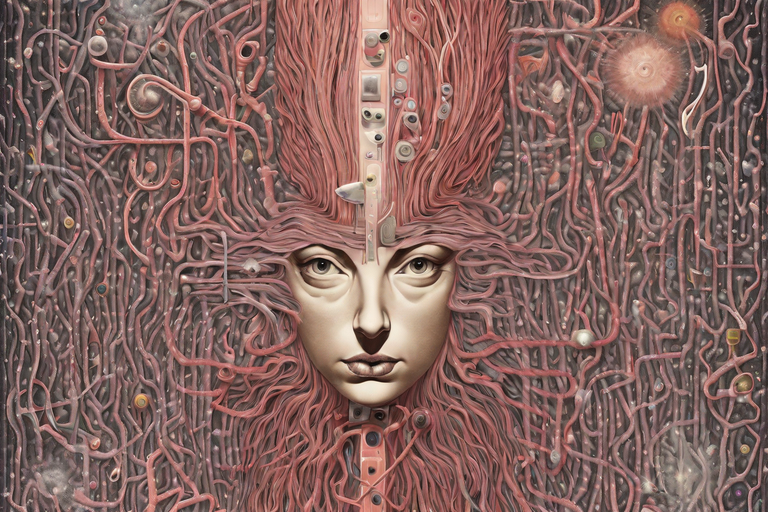Our outer nature is an inversion of the inner. We could even go so far as to say that the ‘outer’ and ‘inner’ natures belong to ‘two different worlds’ and that they are ‘subject to two entirely different laws’, so to speak. The simplest way of putting this is perhaps to say that the outer nature is inherently self-ish, whilst that of the inner self-less. This isn’t how it conventionally sounds however; when we say ‘self-less’ what we very much tend to mean is that the self in question is acting in a moral and admirably altruistic fashion, and when we say ‘selfish’ what we mean is that the self is acting in a way that is obviously geared purely to its own benefit and that for this reason it has no regard for anyone or anything else. It’s still a self in both cases however – it’s the very same self that is behaving in two (apparently) different ways. There is the (supposedly) ‘good self’ and there is the (supposedly) ‘bad self’!
Our inner (or intrinsic) nature isn’t made up of any self however – whether it’s a ‘good’ self or a ‘bad’ self, a self that is behaving well or behaving terribly. There is no trace of self in it, just as there are no lumps or clumps in water or no nodules in fresh air. This appears to be very hard concept to grasp – we can all understand this how they could be a number of different states in matter, for example ‘gas’, ‘liquid’ and ‘solid’. The whole point of the gaseous phase is that there is no solid in it and we don’t have any problems at all in understanding this. Our habitual way of thinking means however that ‘selflessness’ is almost certainly going to be taken up wrongly – it’s very hard to see this in a way that has nothing to do with the moral behaviour of any assumed self, but really it’s a very simple proposition – sandcastles are made of sand just as the everyday self is made at a selflessness. If we delve deeply into a sandcastle with probing fingers we discover nothing but sand, and if we delve into the everyday self with our awareness we will discover nothing but selflessness (which is admittedly an awkward metaphor but it makes the point well enough).
As we have just said, this isn’t some fancy philosophical idea, it’s a very straightforward proposition – just as all ‘aggregates’ are made up of finer particles, just as ice cubes are made of water, so too is the everyday corpuscular self made up of ‘finer’ stuff that isn’t actually self-like, and which isn’t actually even stuff when it comes right down to it. What could be easier to understand this? There is a problem all the same when it comes down to the question of understanding selflessness and this problem has to do with the rather radical challenge that this presents us with. We are – when it comes down to it – extraordinarily attached to the notion of the self. We are biased and we can’t be otherwise. We so very attached to the notion of the self that we won’t allow ourselves to see that it is only a notion, that it is only a ‘nominal centre’! Instead, we insist that it is a fundamental reality, an independently existing entity that most definitely can’t be reduced to anything more essential.
It is therefore our unconscious fear around losing the idea of the concrete self makes us react to the proposition that we are essentially made up of selflessness in such an adverse way, and firmly close our minds to it in the way that we do. In a nutshell, we can’t allow ourselves to look any closer at the suggestion not because we suspect that there is no truth in it, or because we find it too complicated or arcane, but because of the exact opposite reason – we don’t want to explore this particular proposition because we are afraid that we might understand it all too well! This can work the other way too of course, although this is much less common situation. Instead of being afraid of selflessness (or emptiness) we can get greedy to experience it and actively seek to attain the state, which we see as being an especially exalted or preferred modality of being. This is a very well-known phenomenon in Buddhism, where it is called ‘attachment to emptiness’. The self wants to redeem itself by pretending not to be there, and believing its own story and so we can say that it is the idea of emptiness that we are in love with here not emptiness itself.
Insisting (without knowing that we are insisting) on the fundamental reality of the concrete self is how we create fear – this is how we both hide from fear and create it at the same time. If there is nothing beyond the self, then the loss of the self means the loss of everything – it’s the ultimate disaster. The self is an unreal thing, and yet it is at the same time the most important thing in the whole world to us. On the other hand, there is also as we have said the situation (which is admittedly only rarely encountered) of ‘the self that is romantically enamoured of selflessness’ but to be self which is enamoured of the idea of selflessness and which is therefore constantly straining to come to become ‘unself-like’ is a remarkably preposterous kind of thing. All that happens then is we is that we end up with a ‘distorted’ self which now has to bear the onerous burden of ‘straining to be what it cannot be’ the whole time. In addition, we will then fall under the power of the delusion that we have achieved a more exalted state of being than is usual, which will naturally cause us to be unpleasant and obnoxiously judgemental towards people who obviously aren’t as enlightened as we are. The unacknowledged pain that we have created for ourselves by ‘straining to be what we’re not’ is duly inflicted upon the unworthy, in other words (which they deserve because they’re not playing the game that we are) and this is the very well-known phenomenon of the toxic ‘spiritual or religious ego’!
If we wanted to work with the self in a genuine way (i.e. if we don’t want to spread spiritual toxicity around the place under the guise of ‘doing good works’) then we would be much better off ‘allowing the self to be the self’ and allowing it therefore to behave operate as a self naturally does. This is the ‘non-violent approach’ to spirituality! We might think that this is a cop-out in that we are simply letting the self be as ‘selfish’ as it likes to the detriment of all concerned, but this isn’t how it works. The concrete self thrives when we pretend it isn’t there, or when we are blissfully unconscious of it, not when we are aware of it. It is used to operating ‘under the cover of darkness’ in other words, which is to say, in the absence of any awareness. Then it gets on just fine, like a thief in the night! When awareness is brought into the picture however then the dynamic is changed and the self can no longer function as it needs to – it shrinks down to more modest proportions then, so to speak, instead of being a tyrant with unlimited power, instead of being the undisputed ‘be all and end all’.
This equates to what Anthony De Mello calls ‘self-observation’, which he defines as watching yourself, with interest and close attention to detail, as if you were someone else. We don’t ‘take it personally‘, in other words. The point is that this potentially gives us the perspective to ‘observe without reacting’, to ‘observe without judging’. If it is me that is doing all this stuff, then I’m shocked and appalled and I will feel obliged to blame myself or promise faithfully to change the way I am to cover up my embarrassment. I will automatically try to change myself, to bring my behaviour in line with I think it should be, and the problem with this is that ‘control drives out awareness’. Everything is measured against the mind’s assumed standards and this means that nothing is seen for what it is. Everything is then no more than a judgement; the whole world is seen in terms of judgements, and so nothing is ever seen truly. Everything we see is merely a projection of the mind, either positive or negative.
Self-observation is a subtle kind of thing therefore – it can’t be done for a reason, it can’t be done in order for us to fit in some sort of ‘plan’ that we have for ourselves. If that were the case then the thinking mind would be directing the show, in accordance with its judgements, in accordance with the plan that it has in mind. In this case there immediately comes into being what the Buddhists call ‘the sickness of right and wrong’ and the sickness of right and wrong precludes any possibility of self-observation. There’s no right versus wrong in what we are observing, that is only in our own mind, that is only in our own judgemental way of looking. We can’t observe things being ‘the wrong way’, we can only observe things being what they are. We can only observe things being what they are and this is a much simpler situation – as well as being the only true situation. Anything else is just a complicated game that we are playing – anything else is just a complicated game that we started playing and now can’t stop! The game of thought has no ‘off-button’, as we all know only too well…
The self and the thinking mind are the two sides of the very same thing and so if we put the mind in charge then we are also putting the self in charge. When we practice self-observation for a reason then at the same time we are ‘putting the self behind the steering wheel’. But how can we possibly put the self in charge of self-observation? That would be like putting Count Dracula in charge of a blood bank. The self can never ‘observe’; it is incapable of observing – all it can ever do is project its own taken-for-granted viewpoint out onto the world. If it were to try to observe itself then it would either validate or castigate itself and neither of these two reactions can do anything else other than reinforce itself. Both of these reactions are good for one thing and one thing only and that is confirm the centrality of the self that is doing (or trying to do) the observing. Clearly, endlessly confirming the centrality or validity of the self that is trying to do the observing is not going to help anyone.
Because self-observation is a very subtle kind of thing it is not something we can ‘enrol on a course and learn’, in the same way that we might learn something else – the only reason we would be enrolling on the course anyway would be presumably – be because we want to ‘better ourselves’ and so would be starting off on the wrong foot right from the beginning. If we have the agenda to improve ourselves (or fix ourselves in any way) then this agenda is coming from the thinking mind – which is of course where all agendas come from. Or, alternatively, we could say that the agenda is coming from the self – the self always wants to fix itself or better itself (or fix or improve its surroundings, if it orientated that way). This is actually what the self is – it’s a knot of tension, as Alan Watt says; it’s a knot of striving, either ‘striving to avail of the good doing’ or ‘striving to get away from the unpleasant bad thing’. That is all that the self is. The self is the game that is endlessly played between the two unreal poles of ‘gain and ‘loss’ (or ‘accomplishment’ and ‘failure’).
This gives us a good way of talking about this thing that we have called ‘selflessness’ – we can say that selflessness is the absence of striving, the absence of any attempt or inclination to gravitate towards the desirable outcome or away from the undesirable one. We could also say that it is we could say that it is the absence of like and dislike, and the investment of controlling on the basis of like and dislike. It is true that this definition is in a way rather redundant – of course there is no striving, no like or dislike, or desire on the one hand and fear on the other; of course there is no straining towards the advantage or away from the disadvantage – who would the advantage be for, after all? Who is it that will be saddled with the undesirable outcome’?
It is problematic trying to think about this however; it is problematic for the reasons we have already given. On a very deep down level (whether we wish to intellectually rebel against it or not) we are convinced that the self is the irreducible basic irreducible element of our experience, the carrier of our consciousness, ‘something beyond which there is nothing’. Life without the central nucleus of the self is worthless, we think, and this means that we will hang onto it until the very last. Even if the life of the self has become so narrow and repetitive in its nature is to be completely lacking in joy, we will still cling to it out of fear; the more impoverished and mean the life of the self gets the more we cling onto it, in fact. Our existence may be an ongoing exercise in misery and futility but we will not take the risk of letting go of it; the self is infinitely risk-averse, after all – what it believes in ‘is getting what he wants’ (or automatically striving for what we see as the advantages’), and this is a little something we call ‘control’. Control is – of course – all about eliminating risk, not embracing it.
Control can be used in two ways, we might say – either we can try to control the world and other people so as to bring them into line with the way we think they should be (judging is a version of this since even if we’re not actively trying to manipulate what’s going on we are still validating to ourselves the idea that they shouldn’t be the way that they are and that what they are doing is ‘a wrong thing’) or we can try to control ourselves to bring ourselves more into line with our ideas of what is right and proper. Either we’re judging others or we’re judging ourselves. Whether we’re trying to improve ourselves or improve the world it’s the same thing however – we’re obeying the thinking mind. The game we’re playing is the game of ‘projecting our ideas onto reality and never having to question them’. No matter what, we don’t want to let go of our ideas, and the other way of putting this is to say that no matter what, we don’t want to let go of our striving, our endless controlling…
When the self observes it judges – it has no other option open to it. The self is ‘a bias’ pure and simply (whatever else could it ever possibly be?) and all its so-called observing is based upon the arbitrary bias that is it. Everything the self does – whether it is ‘observing’ or ‘acting’ is an extension of this bias, a propagation of this bias, a furtherance of this bias. Whenever it tries to help itself therefore, it does so by furthering and promoting itself even more and this merely adds to the mess that we’re in. The self is essentially a type of entity (or pseudo-entity, rather) that cannot ever see reality, and which also does not ever want to see reality. It is founded upon the principle of ‘not wanting to see reality’ (and this is of course just another way of saying that it is founded upon fear). The self is – therefore – nothing more than fear; there’s nothing more to it than this and that is why it cannot be expected to observe itself in any honest or unbiased way. To do this it would have to go against the very principle that it is predicated upon – fear and honesty do not go together! When we observe the self therefore this is always an act of courage. Dare we see the self for what it is, or will we simply continue to glorify it in the way that we always do?
Image – wallhere.com






